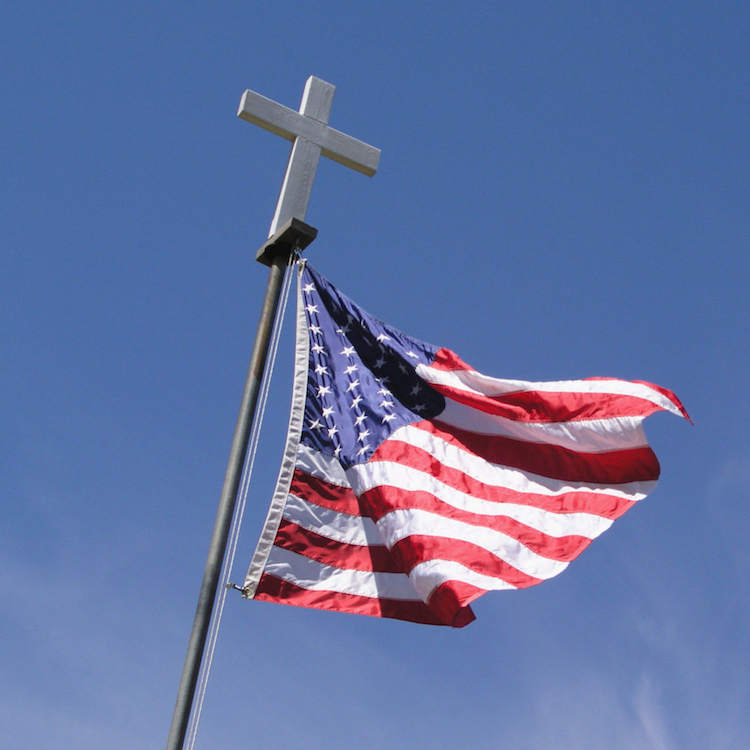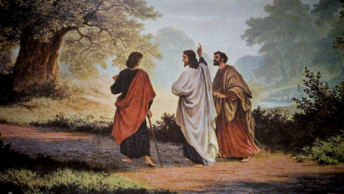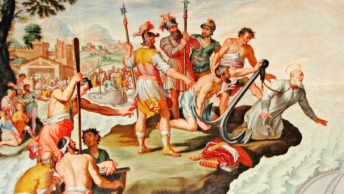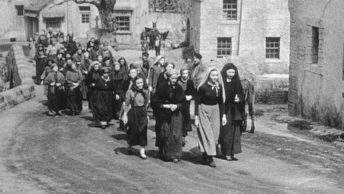In the November wake of 9/11, I bought a small lapel pin at the St. Patrick Cathedral gift shop in New York City. It depicted a small cross and an American flag, leaning on each other at a 45-degree angle. The pin beautifully linked these two revered symbols in a vital union that captured the country’s intense emotional feelings that had loudly resonated for those two past months.
Later that week I accidentally happened on the tail end of a Requiem Mass for one of the 332 fallen firemen of that terrible day in September. With his rich baritone voice, Officer Daniel Rodriguez, the Singing Policeman, was ending the Mass with his powerful rendition of Julia Ward Howe’s The Battle Hymn of the Republic. His operatic marriage of cross and flag reinforced the underlying meaning of my pin.
Months later, I wore my pin to our parish’s men’s Bible study. One of our new members shook his head when he saw my pin. He said it made him feel uncomfortable to see a cross and a flag joined in such a public way. I was more stunned by his reaction. Had it been a crescent and a flag, I might have agreed with him. His objection did get me to question the moral relationship between faith and patriotism.
All Catholics should ask themselves whether they are American Catholics or Catholic Americans. The difference is much greater than mere semantics. The words are not hyphenated, like Irish-American or African-American where there is a pretense of equality not preference.
In American Catholic the primary word is the noun Catholic with its attendant modifier American. The noun designates one’s essence while the modifier merely describes accidentals, such as a smart or devout Catholic. Catholic American identifies American as the primary meaning, not Catholic. An American Catholic is one who generally will choose the cross of faith above his love of country while the Catholic American will usually hold the flag of man high over his Church when there is a deep moral conflict.
The real problem for Catholics revolves around many of the country’s democratic principles and institutions. Under the extra-constitutional rubric of separation of Church and state Catholics have been browbeaten into believing that they must stow their religion and more importantly, its moral teachings, in their closets at home. For diehard secularists, religion is an article of clothing that should only be worn in the privacy of one’s home.
In the public square Catholics have also been conditioned to believe in free and absolute choice and equality for all without consequence. When applied to traditional morality, this absolute freedom to do whatever one wants, especially with regards to sexual morality, easily trumps Church teachings on chastity, modesty and the threat of moral confusion, or what the Church used to call scandal. I wonder just how many Catholic American parents think nothing of encouraging their daughters to use birth control, cohabit with their boyfriends and, if the situation dictates, abort their own grandchildren.
Another good example is the celebrated case of Terry Schiavo, the brain-damaged, though not terminally ill, woman in Florida many years ago. Catholics who sided with the civil rights of her husband in his insistence of her duty to die apparently left the Church’s teachings on suffering and the sanctity of life on the bathroom floor. The list is too long to address all the Catholic American politicians who consistently oppose Church teachings on a host of moral issues, especially abortion. The same may even be said of liberal priests, nuns and teachers whose public positions often create a feeling of moral confusion among their flocks.
Given the attitudes of so many Catholic Americans in the public eye, is it surprising that countless Catholics ignore and even actively oppose Church teachings on homosexual marriage, the ordination of women and embryonic stem-cell research? In a society that has lost touch with its religious underpinnings, is it surprising that American Catholics have been pushed to the sidelines for their social intolerance? Isn’t it high time American Catholics pushed packed back?









“He said it made him feel uncomfortable to see a cross and a flag joined in such a public way. I was more stunned by his reaction. Had it been a crescent and a flag, I might have agreed with him.”
So joining a religion with patriotism is either good or bad depending on the religion?